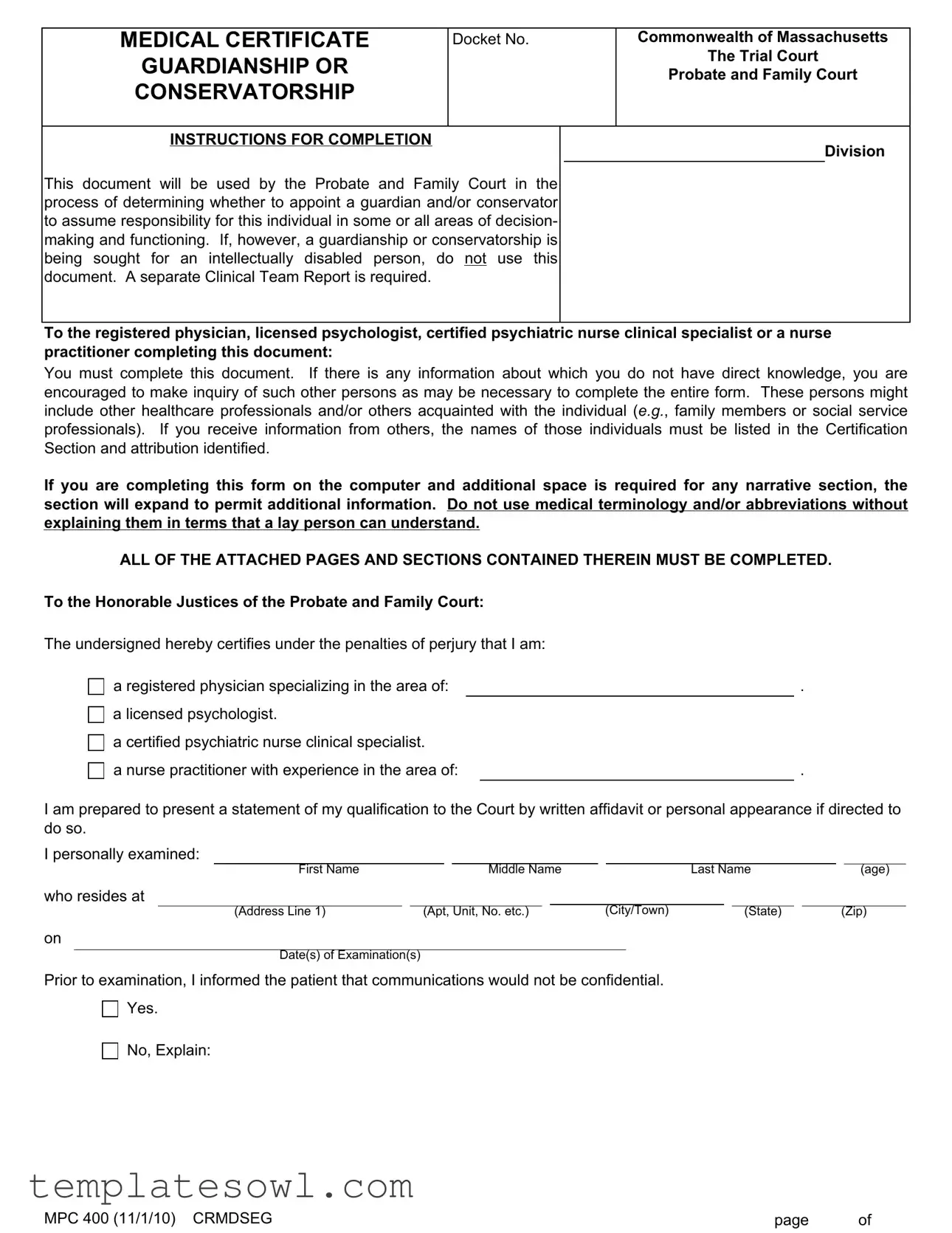Fill Out Your Ma Medical Certificate Form
The MA Medical Certificate form plays a vital role in the process of appointing a guardian or conservator for individuals who may lack the capacity to make informed decisions regarding their personal affairs. This document is specifically utilized by the Probate and Family Court in Massachusetts when evaluating the need for a guardian or conservator. Importantly, it is designed for cases that do not involve intellectually disabled persons, who require a different type of documentation, namely the Clinical Team Report. Completing the form requires careful attention; registered physicians, licensed psychologists, certified psychiatric nurse clinical specialists, or nurse practitioners must provide comprehensive details about the individual's mental and physical conditions, their ability to manage everyday tasks, and any necessary medications. Additionally, the form prompts professionals to consider the individual's social network, living conditions, and potential risks to their safety or well-being. Gathering this information may involve consultations with family members, other healthcare providers, and social service professionals. The completed certificate must reflect a thorough assessment of the individual's limitations and strengths, ultimately guiding the court's decision on the most appropriate level of care and support needed for the individual in question.
Ma Medical Certificate Example

MEDICAL CERTIFICATE
GUARDIANSHIP OR CONSERVATORSHIP
Docket No.
Commonwealth of Massachusetts
The Trial Court
Probate and Family Court
INSTRUCTIONS FOR COMPLETION |
Division |
|
This document will be used by the Probate and Family Court in the process of determining whether to appoint a guardian and/or conservator to assume responsibility for this individual in some or all areas of decision- making and functioning. If, however, a guardianship or conservatorship is being sought for an intellectually disabled person, do not use this document. A separate Clinical Team Report is required.
To the registered physician, licensed psychologist, certified psychiatric nurse clinical specialist or a nurse practitioner completing this document:
You must complete this document. If there is any information about which you do not have direct knowledge, you are encouraged to make inquiry of such other persons as may be necessary to complete the entire form. These persons might include other healthcare professionals and/or others acquainted with the individual (e.g., family members or social service professionals). If you receive information from others, the names of those individuals must be listed in the Certification Section and attribution identified.
If you are completing this form on the computer and additional space is required for any narrative section, the section will expand to permit additional information. Do not use medical terminology and/or abbreviations without explaining them in terms that a lay person can understand.
ALL OF THE ATTACHED PAGES AND SECTIONS CONTAINED THEREIN MUST BE COMPLETED.
To the Honorable Justices of the Probate and Family Court: |
|
||
The undersigned hereby certifies under the penalties of perjury that I am: |
|
||
a registered physician specializing in the area of: |
|
. |
|
a licensed psychologist. |
|
||
a certified psychiatric nurse clinical specialist. |
|
||
a nurse practitioner with experience in the area of: |
|
. |
|
I am prepared to present a statement of my qualification to the Court by written affidavit or personal appearance if directed to do so.
I personally examined:
First NameMiddle NameLast Name(age)
who resides at
(Address Line 1) |
(Apt, Unit, No. etc.) |
(City/Town) |
(State) |
(Zip) |
on
Date(s) of Examination(s)
Prior to examination, I informed the patient that communications would not be confidential.

 Yes.
Yes.

 No, Explain:
No, Explain:
MPC 400 (11/1/10) CRMDSEG |
page |
of |

1.CLINICALLY DIAGNOSED CONDITION(S) THAT RESULT IN INCAPACITY
A.Description of mental and physical condition
Describe the individual's mental and physical conditions necessitating the appointment of a guardian and/or conservator, including the date of onset and disease course.
B.Stability of mental and physical condition and living setting
I.In the past 90 days, has the individual's mental and/or physical condition changed?
Yes No
If yes, please explain:
Uncertain
II. In the past 90 days, has the individual's living setting (i.e. community, hospital, nursing facility) changed?
Yes No
If yes, please explain:
C. Prognosis for Improvement
Uncertain
With reasonable medical certainty, within the next 90 days, is the individual's mental and/or physical conditions likely to change substantially?
Yes
No
Uncertain
If yes, explain whether the condition is likely to worsen or improve, as well as if there are any aggravating factors that could make the individual appear confused but could improve with time or treatment (e.g. delirium, acute medical illness, the interaction of multiple medications, hearing loss, vision loss, bereavement, etc.):
If improvement is possible, the individual should be |
weeks. |
|||||
D. List all Medications (or attach list): |
|
|
|
|
|
|
|
|
|
|
|
|
|
Name |
Dosage/Schedule |
|
If an |
|||
|
indicate with a checkmark. |
|||||
|
|
|
|
|||
|
|
|
|
|
|
|
|
|
|
|
|
|
|
|
|
|
|
|
|
|
|
|
|
|
|
|
|
|
|
|
|
|
|
|
|
|
|
|
|
|
|
|
|
|
|
|
|
|
|
|
|
|
|
|
|
|
|
|
|
|
|
|
|
|
|
|
|
|
|
|
|
|
|
|
|
|
|
|
|
|
|
|
|
|
|
|
|
|
|
|
click to add
click to remove
MPC 400 (11/1/10) CRMDSEG |
page |
of |

Could any of these medications impair mental functioning:
If yes, explain:
Yes
No
Uncertain
2. INABILITY TO RECEIVE AND EVALUATE INFORMATION OR TO MAKE OR COMMUNICATE DECISIONS
A. Alertness/Level of Consciousness
Overall Impairment: |
None |
Mild |
Moderate |
Severe |
B. Memory and Cognitive Functioning (e.g., memory, comprehension, reasoning, judgment, planning, insight)
Overall Impairment: |
None |
Mild |
Moderate |
Severe |
C. Emotional and Psychiatric Functioning (e.g., mood, anxiety, psychotic, substance use and other disorder)
Overall Impairment: |
None |
Mild |
Moderate |
Severe |
Describe how impairments in A, B, and/or C cause the individual to have an inability to receive and evaluate information or make or communicate decisions:
3.1GUARDIANSHIP: INABILITY TO MEET ESSENTIAL REQUIREMENTS FOR PHYSICAL HEALTH, SAFETY, AND
If seeking guardianship of the person, complete section 3.1. If seeking only a conservatorship, do not complete this section. Limited Guardianship is preferred by the Court; describe how the guardianship may be limited. Describe how the assessment was performed and give specific examples.
A.Areas in which the individual is able to meet the essential requirements for physical health, safety, and
Describe the individual's retained abilities and adaptive behavior for physical health, safety,
B.Areas in which the individual is unable to meet essential requirements for physical health, safety, or
C.If individual is unable to make any decisions for him or herself or is unable to meet any essential requirements for physical health, safety, and
MPC 400 (11/1/10) CRMDSEG |
page |
of |

3.2 CONSERVATORSHIP: INABILITY TO MANAGE PROPERTY OR BUSINESS AFFAIRS EFFECTIVELY
If seeking conservatorship of the estate and affairs, complete section 3.2. If seeking only a guardianship of the person, do not complete this section. Limited Conservatorship is preferred by the court; describe how the conservatorship may be limited. Describe how the assessment was performed and give specific examples.
A.Areas in which the individual is able to manage property or business affairs effectively:
Describe the individual's retained abilities and adaptive behavior for management of property and estate for which the conservatorship may be limited (e.g., ability to manage allowance, bills, donations, investments, real estate, protect assets, resist fraud).
B.Areas in which the individual is unable to manage property or business affairs effectively:
Describe the impairments in the management of property and business affairs for which the individual requires a conservator. Describe how the person has property that will be wasted or dissipated unless management is provided and/or how protection is necessary to provide money for the support, care and welfare of the person or those entitled to the person's support.
C.If the individual is unable to make any decisions about, and is unable to manage, any property or business affairs effectively (i.e. requires a full conservatorship), describe why:
4.VALUES AND PREFERENCES
Describe the individual's values, preferences, and patterns, including previously described preferences (e.g., under durable power of attorney, advance directive, health care proxy, or living will documents), whether the individual accepts or opposes the guardianship/conservatorship, where the individual prefers to live, what makes life meaningful for the individual, and religious or cultural considerations.
5.SOCIAL NETWORKS AND RISK OF HARM TO SELF OR OTHERS
A.Social Network Relationships Social Support (Check one)

 Very good supportive network
Very good supportive network
Social Skills (Check one)

 Very good social skills
Very good social skills
B.Nature of Risks
Some support from family and friends
Good social skills
Limited or nonexistent support
Poor social skills
Describe the significant risks facing this individual and specify whether these risks are due to this individual's condition and/or due to another person harming or exploiting him or her:
MPC 400 (11/1/10) CRMDSEG |
page |
of |

C. |
The individual's risk of harm to self or others is: |
Mild |
Moderate |
Severe |
|
D. |
The likelihood of harm is: |
Almost Certain |
Probable |
Possible |
Unlikely |
6.RECOMMENDATIONS FOR LEVEL OF CARE/SUPERVISION NEEDED, INCLUDING HOUSING A. An institutional placement being pursued at the following:
Nursing home/Rehabilitation |
Psychiatric facility |
Other facility |
None |
If none, skip to section 7; if yes, answer:
Uncertain
B. The individual requires the following level of supervision: |
|
||
Locked facility |
24 hr. supervision |
Some |
None |
Less restrictive placement options have been pursued: |
|
||
Yes |
No |
Uncertain |
|
The placement is anticipated to be: |
|
|
|
Uncertain |
|
||
Describe the specific reasons for placement and efforts made to preserve the person's social support system (e.g. placement in community of residence or near family):
7. RECOMMENDATIONS FOR APPROPRIATE TREATMENT AND HABILITATION: The individual may benefit from:
Educational potential, training, or rehabilitation |
Yes |
No |
Uncertain |
||
Technological assistance or accommodations |
Yes |
No |
Uncertain |
||
Mental health treatment |
Yes |
No |
Uncertain |
||
Occupational, physical, or other therapy |
Yes |
No |
Uncertain |
||
Home and/or social services |
Yes |
No |
Uncertain |
||
Medical treatment, operation or procedure |
Yes |
No |
Uncertain |
||
Other: |
|
|
|
|
|
Describe any specific recommendations: |
|
|
|
||
8. ATTENDANCE AT HEARING
It would be clinically harmful for the individual to attend the hearing. Describe why:
MPC 400 (11/1/10) CRMDSEG |
page |
of |

The individual is able to attend the court hearing
What accommodations, if any, would enable the individual to attend the hearing:
9. CERTIFICATIONS
This form was completed based on an
who |
is |
is not a patient under my continuing care and treatment. |
In addition to a clinical examination, other sources of information for this examination:

 Review of medical record.
Review of medical record.

 Discussion with health care professionals involved in the individual's care.
Discussion with health care professionals involved in the individual's care.

 Discussion with family or friends.
Discussion with family or friends.

 Other
Other
Names and titles/relationships of those individuals who assisted in preparation of this report:
Name |
Title/Relationship |
|
|
|
|
|
|
|
|
|
|
click to add |
|
click to remove |
List any tests which bear upon the issues of incapacity and date of tests: |
|
|
|
|
|
|
|
|
|
Test |
|
Date |
|
|
|
|
|
|
|
|
|
|
|
|
|
|
|
|
|
|
|
|
|
|
click to add
click to remove
MPC 400 (11/1/10) CRMDSEG |
page |
of |

This document must be signed and dated by the person completing it. It does not need to be notarized.
I hereby certify that the evaluation of diagnosis, cognition, and function is within the scope of my professional competence based upon my education, training, and experience. I further certify that this report is complete and accurate to the best of my information and belief.
Signed under the penalties of perjury:
|
|
|
|
|
|
|
Date |
|
|
|
|
|
||||
|
SIGNATURE OF CLINICIAN |
|
|
|
|
|
|
|
|
|
|
|
||||
|
|
|
|
|
|
|
|
|
|
|
|
|
|
|
|
|
|
|
(Print name) |
|
|
|
|
|
License type, number, and date |
|
|||||||
Office Address: |
|
|
|
|
|
|
|
|
|
|
|
|||||
|
|
(Address) |
|
|
(Apt, Unit, No. etc.) |
|
|
|
|
(City/Town) |
|
(State) |
|
|
(Zip) |
|
Office Phone:
Reset Form
MPC 400 (11/1/10) CRMDSEG |
page |
of |
Form Characteristics
| Fact Name | Details |
|---|---|
| Document Purpose | This form is used to assess an individual's need for a guardian or conservator. |
| Governing Law | Massachusetts General Laws Chapter 190B governs guardianship and conservatorship matters. |
| Eligibility | Only qualified healthcare professionals may complete this form. |
| Information Gathering | Completing physicians must gather information from other relevant individuals if necessary. |
| Confidentiality Notice | The patient must be informed that communications are not confidential before the examination. |
| Comprehensive Evaluation | All pages and sections of the form must be completed accurately. |
| Recommendation for Improvement | Assessors must comment on the potential for the individual’s condition to improve or worsen. |
Guidelines on Utilizing Ma Medical Certificate
Completing the MA Medical Certificate form involves following specific steps to ensure that all necessary information is accurately documented. It is important that each section is filled out completely and clearly to assist the court in the evaluation process. Below are the steps needed to fill out the form properly.
- Obtain the MA Medical Certificate form and ensure you have all necessary information about the individual.
- Fill in the docket number at the top of the form.
- Identify yourself by entering your title (physician, psychologist, nurse practitioner, etc.) and the area of your specialization.
- Enter your personal details and confirm that you are prepared to provide a statement of qualification if requested.
- Complete the section detailing the individual's name, age, and address, including the date(s) of examination(s).
- Indicate whether you informed the patient that communications would not be confidential by checking the appropriate box.
- Describe the individual's mental and physical conditions and provide details on the date of onset and disease course.
- Address any changes in the individual’s mental and physical condition in the past 90 days, if applicable.
- Evaluate the prognosis for improvement, detailing whether changes are likely and any factors that could influence this outcome.
- List all medications the individual is taking, including dosage and schedules, and note any that may impair mental functioning.
- Assess the overall impairment levels for alertness, memory, cognitive functioning, and emotional health, providing descriptions as needed.
- For guardianship, specify areas where the individual can meet essential requirements and where they cannot, providing examples.
- If seeking conservatorship, complete the relevant section regarding management of property or business affairs, detailing the individual's abilities and challenges.
- Document the individual's values and preferences that impact decisions about guardianship or conservatorship.
- Identify social support networks and assess risks the individual may face, providing relevant descriptions.
- Indicate the recommended level of care or supervision the individual will need, including suggestions for institutional placement if necessary.
- Specify any recommended treatment or habilitation services that may benefit the individual.
- Note the impact of attending the hearing on the individual and explain any necessary reasons.
What You Should Know About This Form
What is the purpose of the MA Medical Certificate form?
The MA Medical Certificate form is used in the Probate and Family Court to assess whether an individual requires a guardian or conservator. This decision is essential as it determines who will be responsible for the person’s decision-making and wellbeing. It is particularly important to ensure that the individual receives the necessary support and care if they are unable to make informed choices about their life.
Who can complete the MA Medical Certificate form?
The form must be completed by qualified professionals, including registered physicians, licensed psychologists, certified psychiatric nurse clinical specialists, or nurse practitioners. These individuals must have firsthand knowledge of the patient's condition and are encouraged to consult with other caregivers or family members if needed. Their expertise and experience are crucial in providing an accurate assessment.
What information must be included in the form?
The form requires detailed information about the individual's mental and physical health conditions, including diagnosis, prognosis, and any medications they may be taking. It also asks for an assessment of the individual's ability to make decisions and care for themselves, as well as an evaluation of their living situation and social networks.
Can the form be completed electronically?
Yes, the form can be completed electronically. If additional space is needed for any section, the document is designed to expand naturally to allow for more detailed responses. However, it is important to remain clear and avoid using complex medical jargon, ensuring that all explanations are understandable to those without medical training.
What happens if the medical condition changes after the certificate is completed?
If there is a change in the individual's mental or physical condition after the form has been completed, it is vital to notify the court. This is especially important if the individual's ability to make decisions or their living situation has altered. Accurate, updated information ensures that the court can make the best decision regarding guardianship or conservatorship.
Is the individual's privacy protected when completing this form?
The medical professionals completing the MA Medical Certificate must inform the individual that communications are not confidential before the examination. This transparency is crucial in maintaining trust while ensuring that the court has access to necessary information. It is advisable that all parties involved understand how this information will be used in the legal proceedings.
Common mistakes
Completing the MA Medical Certificate form can be challenging, and several common mistakes can arise during this process. One significant error is failing to include the required personal information of the individual being assessed, such as their full name and address. Missing this essential information may delay the processing of the case.
Another frequent mistake involves inaccurate or vague descriptions of the individual’s mental and physical conditions. It’s crucial to provide detailed and clear descriptions, including the onset date and how the conditions have progressed. A lack of specifics can lead to misunderstandings about the individual’s needs.
People often neglect to update information regarding recent changes in the individual’s condition or living situation. The form contains sections that require confirmation of any changes in the last 90 days. Inaccurate responses could mislead the court about the urgency of the situation.
Confusion can also arise from vague answers regarding the individual's ability to make decisions. The distinction between mild, moderate, or severe impairment must be clearly articulated. Generic terms do not provide a clear picture and may affect the assessment of the guardianship or conservatorship necessary.
Additionally, individuals completing the form might forget to list any other professionals consulted during the assessment. It is vital to include names and roles of any healthcare providers that contributed to the evaluation for a comprehensive overview of care.
Another mistake is using medical terminology without providing explanations. The form specifically advises against this, as terms that are not clarified can confuse those unfamiliar with medical language. Using layman’s terms ensures understanding.
People may also fail to accurately indicate if medications could impair mental functioning. This oversight can lead to serious consequences if not disclosed, as it may impact the individual’s decision-making capacity.
Leaving out the recommendations for levels of care and supervision is a common error. This section is crucial in determining what kind of support the individual may need after the court’s decision. Skipping it can leave essential questions unanswered.
Failing to address the individual’s social networks can also be problematic. Describing support systems is important as it helps the court understand the individual’s environment and any potential risks related to isolation or abuse.
Finally, individuals often forget to sign the document or provide the necessary certifications. This simple oversight can render the entire document invalid, resulting in delays and requiring a new submission.
Documents used along the form
The Massachusetts Medical Certificate is a crucial document used in proceedings concerning guardianship or conservatorship. However, several other forms and documents are commonly associated with this process. These documents help provide comprehensive information to the Probate and Family Court, ensuring informed decision-making. Below is a list of essential forms that complement the medical certificate.
- Clinical Team Report: Required for guardianship applications involving individuals with intellectual disabilities. This report offers the court detailed clinical observations and evaluations from a qualified team of professionals.
- Affidavit of Adult Individual: If the individual facing guardianship can express their wishes, this document can voice their preferences regarding guardianship and any concerns they may have.
- Guardian’s Petition: This form initiates the legal process for appointing a guardian. It outlines the reasons why guardianship is necessary and provides the potential guardian's qualifications.
- Notice of Hearing: This document informs all relevant parties, including the individual in question, family members, and other stakeholders, about the upcoming court hearing regarding the guardianship or conservatorship case.
- Consent to Medical Treatment: This form outlines the types of medical treatments or interventions that can be performed on the individual under guardianship. It ensures the guardian can make informed medical decisions on behalf of the individual.
- Report of Guardian: Once a guardian is appointed, this document is typically required on a regular basis to update the court on the individual’s well-being, progress, and ongoing needs.
- Application for Conservatorship: This form is necessary for those seeking to control the financial assets or property of an individual who is unable to manage their affairs effectively.
- Letters of Guardianship/Conservatorship: After the court approves the petition, these letters are issued as official documentation of the guardian or conservator’s authority over the individual’s personal or financial matters.
- Health Care Proxy Form: This document allows individuals to appoint someone to make medical decisions on their behalf if they become incapable. It complements the medical certificate by ensuring medical wishes are respected.
Collectively, these documents create a well-rounded framework through which the court can assess the need for guardianship or conservatorship. Understanding these forms can demystify the process, empowering families and individuals to navigate legal pathways with greater confidence and clarity.
Similar forms
The MA Medical Certificate form serves a specific function in the legal context of guardianship and conservatorship proceedings in Massachusetts. Similar documents exist across various legal and medical contexts, each playing a critical role in affirming the health status or decision-making capacities of individuals. Below is a list of documents that share similarities with the MA Medical Certificate form:
- Clinical Team Report: This report is specifically required when seeking guardianship for intellectually disabled individuals. It provides a comprehensive assessment of the individual's needs and capabilities, akin to the medical certificate's role in evaluating the need for guardianship.
- Durable Power of Attorney (DPOA): This legal document allows one person to make decisions on another's behalf, emphasizing the importance of documenting an individual’s capacity to make decisions, similar to the evaluations outlined in the MA Medical Certificate.
- Advance Healthcare Directive: This document expresses an individual's wishes regarding medical treatment when they cannot communicate their preferences, similar to how the medical certificate assesses the individual's current capabilities.
- Psychiatric Evaluation Report: Conducted by mental health professionals, this report details an individual's psychological functioning and ability to make decisions, paralleling the detailed assessments included in the medical certificate.
- Functional Capacity Evaluation: This document assesses an individual's ability to perform activities of daily living. It shares the goal of evaluating how an individual's condition affects their daily decision-making abilities, much like the MA Medical Certificate.
- Life Care Plan: Created for individuals with significant health issues, this plan details the ongoing care needs, including medical and therapeutic services, resembling the treatment recommendations found in the medical certificate.
- Letter of Medical Necessity: Often required for insurance purposes, this letter is written by a healthcare professional to confirm the need for specific medical interventions. It parallels the certification and recommendations found within the MA Medical Certificate.
- Professional Medical Statement for Social Security Disability: This statement provides evidence of an individual's medical condition and its impact on their ability to work, similar to how the medical certificate documents the impact of a condition on decision-making and self-care.
Dos and Don'ts
Things to Do When Filling Out the MA Medical Certificate Form:
- Read all instructions carefully to ensure comprehensive understanding.
- Provide complete and accurate information in each section of the form.
- List the names of individuals from whom you obtained information, if applicable.
- Use clear and plain language, avoiding medical jargon.
- Make sure all required signatures are present before submission.
- Expand narrative sections digitally if additional space is needed.
- Indicate any changes in the individual’s condition over the past 90 days.
- Describe the individual's values and preferences to ensure person-centered planning.
- Document any recommended treatment and rehabilitation needed for the individual.
Things to Avoid When Filling Out the MA Medical Certificate Form:
- Do not leave any sections incomplete; all pages must be filled out.
- Avoid using abbreviations or medical terms without explanations.
- Do not provide information based on hearsay; ensure direct knowledge of the individual’s condition.
- Do not overlook the requirement for a separate Clinical Team Report for intellectually disabled individuals.
- Do not miss the deadline for submission, as it may delay the court process.
- Avoid using vague language; be as specific as possible in descriptions.
- Do not disclose confidential communications without informing the individual in advance.
- Do not forget to document any potential risks to the individual or others.
- Do not disregard the individual’s history and background in your assessment.
Misconceptions
Misconception 1: The MA Medical Certificate form can be used for all types of guardianship or conservatorship cases.
This form is specifically designed for financial or personal guardianship applications. If the guardianship is for an intellectually disabled person, a Clinical Team Report is required instead, which may mislead applicants.
Misconception 2: Only physicians can complete the MA Medical Certificate form.
While registered physicians are one of the approved professionals, licensed psychologists, certified psychiatric nurse clinical specialists, and nurse practitioners may also complete the form. This allows for a wider range of qualified individuals to provide necessary medical insight.
Misconception 3: The information provided in the Medical Certificate does not require thorough verification.
The instructions indicate that the person completing the form should seek additional information if they lack direct knowledge. This may lead to the assumption that verification is unimportant. In truth, it is crucial to ensure all information is accurate and well-supported.
Misconception 4: It is okay to use medical jargon in the Medical Certificate form.
Using jargon without explanations can confuse non-professionals involved in the decision-making process. The form explicitly states that terms must be simplified for a lay audience to understand, emphasizing clarity in communication.
Misconception 5: Completing the MA Medical Certificate is a straightforward process that doesn’t require significant time.
The form requires detailed descriptions of conditions and assessments, which can be time-consuming. Comprehensive evaluations are necessary, requiring proper documentation to provide an accurate representation of the individual's needs.
Key takeaways
Filling out and using the MA Medical Certificate form is a critical process in determining whether an individual requires a guardian or conservator. Here are key takeaways to keep in mind:
- Understand the Purpose: This form is used by the Probate and Family Court to assess the need for guardianship and conservatorship.
- Who Should Complete the Form: Only registered physicians, licensed psychologists, certified psychiatric nurse clinical specialists, or nurse practitioners may fill out this document.
- Direct Knowledge is Essential: Complete the form based on direct examination and knowledge. If not, consult other professionals and document their names.
- Avoid Medical Jargon: Clearly explain any medical terms or abbreviations so that the information is understandable to non-medical individuals.
- Complete All Sections: All pages and sections must be filled out; incomplete forms can delay the process.
- Describe Conditions Thoroughly: Provide a detailed description of the individual’s mental and physical conditions, including their stability and prognosis for improvement.
- Evaluate Decision-Making Ability: Assess the individual's capacity to receive information and make decisions, clearly noting any impairments.
- Outline Living Conditions: Indicate whether the individual can meet their essential requirements for health and safety, and mention if any guardianship should be limited.
- Consider Social Support: Assess the individual's social networks and relationships. Highlight risks they may face and any potential harm from others.
- Recommendations Matter: Provide thoughtful recommendations for treatment, care, or supervision if applicable, including specific placement needs if required.
Careful attention to these areas can help ensure that guardianship or conservatorship is appropriate and beneficial for the individual in question.
Browse Other Templates
Does Dish Have Contracts - Utilize this document to align with FCC rules while seeking permission for dish installation.
Printable Towing Notice - The agreement is effective upon receiving signatures from both parties involved.
